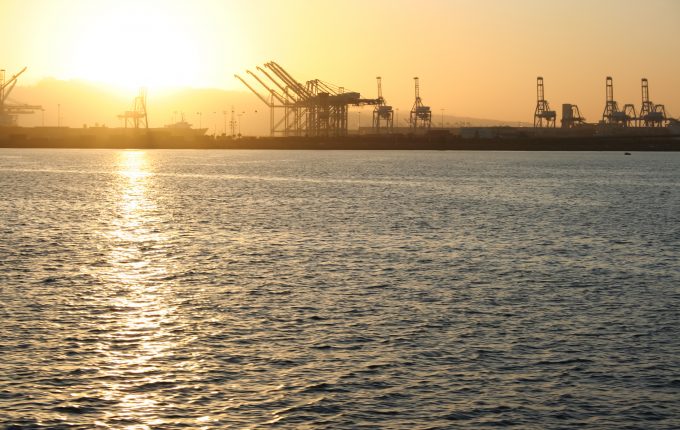News in Brief podcast | Week 30 2024 | Surcharges, strikes and IATA's stressful settlements
In this episode of The Loadstar’s News in Brief Podcast, host and news reporter Charlotte Goldstone ...
TFII: SOLID AS USUALMAERSK: WEAKENINGF: FALLING OFF A CLIFFAAPL: 'BOTTLENECK IN MAINLAND CHINA'AAPL: CHINA TRENDSDHL: GROWTH CAPEXR: ANOTHER SOLID DELIVERYMFT: HERE COMES THE FALLDSV: LOOK AT SCHENKER PERFORMANCEUPS: A WAVE OF DOWNGRADES DSV: BARGAIN BINKNX: EARNINGS OUTODFL: RISING AND FALLING AND THEN RISING
TFII: SOLID AS USUALMAERSK: WEAKENINGF: FALLING OFF A CLIFFAAPL: 'BOTTLENECK IN MAINLAND CHINA'AAPL: CHINA TRENDSDHL: GROWTH CAPEXR: ANOTHER SOLID DELIVERYMFT: HERE COMES THE FALLDSV: LOOK AT SCHENKER PERFORMANCEUPS: A WAVE OF DOWNGRADES DSV: BARGAIN BINKNX: EARNINGS OUTODFL: RISING AND FALLING AND THEN RISING

Labour relations on the US west coast appear to have entered a new era of cooperation between management and unions, according to speakers at last week’s Transpacific Maritime (TPM) conference in Long Beach.
The considerable fury of shippers who blamed the International Longshoremen and Warehouse Union (ILWU) for the crippling port congestion that impeded much of the country’s container supply chains, has largely dissipated – particularly where unions have been put in a position where they can explain themselves to shippers.
Chris Lyttle, executive director of the port of Oakland authority, told delegates that the inclusion of Local 10 – the Oakland branch of the ILWU – in a port efficiency working group had had “a transformative effect”.
He said: “I put a lot of our problems last year down to a lack of education and understanding, and a lot of the time the union wasn’t in the same room [as the other stakeholders in the supply chain].
“Now we include the union in the port efficiency working group we have set up, and Local 10 is contributing in a very collaborative way. Just a few months ago its president handed his business card to a range of BCOs [beneficial cargo owners] and said ‘if you have a problem with your cargo, call me’.
“Getting him in front of the end customer is incredibly important, because it defuses the tension and creates understanding,” Mr Lyttle added.

David Arian, vice-president of the Los Angeles board of harbour commissioners, claimed there was a paradigm shift underway in the role that port authorities play in the wider supply chain.
“The port of Los Angeles began the transition with the appointment of chief executive Gene Seroka – he brought in the concept of changing a port from landlord to hybrid operator.
“What we are now asking ourselves is how can we help each terminal succeed?
“Each terminal has a business plan – they are different and need different help to succeed,” he said, adding that Los Angeles port authority had also set up an efficiency committee.
“Now were are going from terminal to terminal and asking management and labour to come together to improve efficiency, and we have had a couple of terminals where turn-time has been reduced by 21 minutes,” he said.
“It is the role of the modern port authority to be a third-party that brings all the stakeholders together with the simple aim of getting the turn time [in Los Angeles] down to between 35 and 40 minutes,” he added.
Comment on this article
Steve Johnson
March 11, 2016 at 1:18 pmThe union has everything to gain and nothing to lose by “cooperating” now that they got what they wanted. WE’ll see how the game is played when the next round of negotiations come up. I’ll bet my next paycheck they’ll cause the same problems all over again.